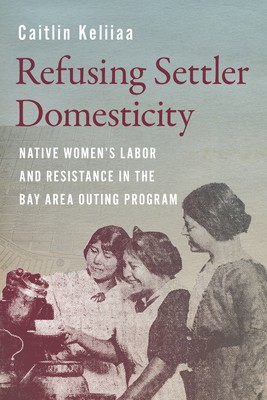
- We will send in 10–14 business days.
- Author: Caitlin Keliiaa
- Publisher: University of Washington Press
- ISBN-10: 0295753005
- ISBN-13: 9780295753003
- Format: 15 x 22.6 x 2.2 cm, minkšti viršeliai
- Language: English
- SAVE -10% with code: EXTRA
Reviews
Description
US Indian boarding schools have captured public interest, but less is known about the "outing" programs that arose from them. This book delves into the intimate lives of Native American women who "outed" in the San Francisco Bay Area. From roughly 1918 to 1942, the Bay Area Outing Program coercively recruited over a thousand Native girls and women from boarding schools to labor as live-in domestic workers. Outing removed Native people from their communities and transferred them to white homes, farms, and businesses to work as menial laborers. In exchange for room, board, and meager pay, Native women and girls as young as twelve cooked, cleaned, and lived in the homes of their employers. Despite oppressive living and working conditions, they strategically resisted the worst aspects of outing, including Indian child removal, sexual surveillance, criminalization, and exploitation. Throughout, they forged social connections and navigated relationships to refuse domestication and assert their agency. In this groundbreaking work, historian Caitlin Keliiaa examines Native women's lived experiences of federal policy and connects outing to the region's longer history of coerced Native labor. Refusing Settler Domesticity explores the unexpected story of Native women in the Bay Area, decades before Indian Relocation, illuminating the women who helped shape the Bay Area Indian community as we know it today. This book, as indictment, expands the existing work on Indian boarding schools, urban Indians, and the history of California and the West.
EXTRA 10 % discount with code: EXTRA
The promotion ends in 23d.12:54:59
The discount code is valid when purchasing from 10 €. Discounts do not stack.
- Author: Caitlin Keliiaa
- Publisher: University of Washington Press
- ISBN-10: 0295753005
- ISBN-13: 9780295753003
- Format: 15 x 22.6 x 2.2 cm, minkšti viršeliai
- Language: English English
US Indian boarding schools have captured public interest, but less is known about the "outing" programs that arose from them. This book delves into the intimate lives of Native American women who "outed" in the San Francisco Bay Area. From roughly 1918 to 1942, the Bay Area Outing Program coercively recruited over a thousand Native girls and women from boarding schools to labor as live-in domestic workers. Outing removed Native people from their communities and transferred them to white homes, farms, and businesses to work as menial laborers. In exchange for room, board, and meager pay, Native women and girls as young as twelve cooked, cleaned, and lived in the homes of their employers. Despite oppressive living and working conditions, they strategically resisted the worst aspects of outing, including Indian child removal, sexual surveillance, criminalization, and exploitation. Throughout, they forged social connections and navigated relationships to refuse domestication and assert their agency. In this groundbreaking work, historian Caitlin Keliiaa examines Native women's lived experiences of federal policy and connects outing to the region's longer history of coerced Native labor. Refusing Settler Domesticity explores the unexpected story of Native women in the Bay Area, decades before Indian Relocation, illuminating the women who helped shape the Bay Area Indian community as we know it today. This book, as indictment, expands the existing work on Indian boarding schools, urban Indians, and the history of California and the West.


Reviews